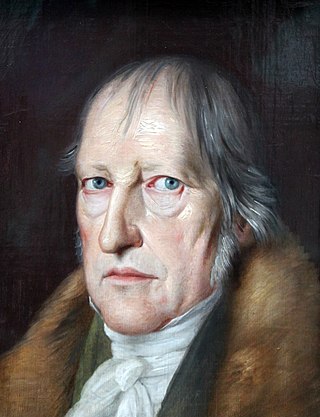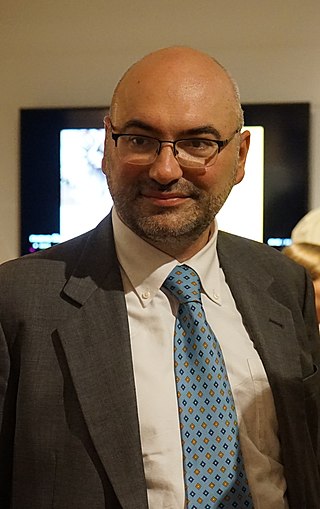
Georg Wilhelm Friedrich Hegel was a German philosopher. He is one of the most important figures in German idealism and one of the founding figures of modern Western philosophy. His influence extends across the entire range of contemporary philosophical topics, from metaphysical issues in epistemology and ontology, to political philosophy, the philosophy of history, philosophy of art, philosophy of religion, and the history of philosophy.
Historicism is an approach to explaining the existence of phenomena, especially social and cultural practices, by studying their history, that is, by studying the process by which they came about. The term is widely used in philosophy, anthropology, and sociology.

In philosophy, the term idealism identifies and describes metaphysical perspectives which assert that reality is indistinguishable and inseparable from perception and understanding; that reality is a mental construct closely connected to ideas. Idealist perspectives are in two categories: subjective idealism, which proposes that a material object exists only to the extent that a human being perceives the object; and objective idealism, which proposes the existence of an objective consciousness that exists prior to and independently of human consciousness, thus the existence of the object is independent of human perception.
Dialectic, also known as the dialectical method, is a discourse between two or more people holding different points of view about a subject but wishing to establish the truth through reasoned argumentation. Dialectic resembles debate, but the concept excludes subjective elements such as emotional appeal and rhetoric. Dialectic may thus be contrasted with both the eristic, which refers to argument that aims to successfully dispute another's argument, and the didactic method, wherein one side of the conversation teaches the other. Dialectic is alternatively known as minor logic, as opposed to major logic or critique.

German philosophy, meaning philosophy in the German language or philosophy by German people, in its diversity, is fundamental for both the analytic and continental traditions. It covers figures such as Gottfried Wilhelm Leibniz, Immanuel Kant, Georg Wilhelm Friedrich Hegel, Karl Marx, Friedrich Nietzsche, Martin Heidegger, Ludwig Wittgenstein, the Vienna Circle, and the Frankfurt School, who now count among the most famous and studied philosophers of all time. They are central to major philosophical movements such as rationalism, German idealism, Romanticism, dialectical materialism, existentialism, phenomenology, hermeneutics, logical positivism, and critical theory. The Danish philosopher Søren Kierkegaard is often also included in surveys of German philosophy due to his extensive engagement with German thinkers.

Elements of the Philosophy of Right is a work by Georg Wilhelm Friedrich Hegel published in 1820, though the book's original title page dates it to 1821. Hegel's most mature statement of his legal, moral, social and political philosophy, it is an expansion upon concepts only briefly dealt with in the Encyclopedia of the Philosophical Sciences, published in 1817. Law provides for Hegel the cornerstone of the modern state. As such, he criticized Karl Ludwig von Haller's The Restoration of the Science of the State, in which the latter claimed that law was superficial, because natural law and the "right of the most powerful" was sufficient. The absence of law characterized for Hegel despotism, whether absolutist or ochlocracist.

Jakob Friedrich Fries was a German post-Kantian philosopher and mathematician.

In the 19th century, the philosophers of the 18th-century Enlightenment began to have a dramatic effect on subsequent developments in philosophy. In particular, the works of Immanuel Kant gave rise to a new generation of German philosophers and began to see wider recognition internationally. Also, in a reaction to the Enlightenment, a movement called Romanticism began to develop towards the end of the 18th century. Key ideas that sparked changes in philosophy were the fast progress of science, including evolution, most notably postulated by Charles Darwin and Jean-Baptiste Lamarck, and theories regarding what is today called emergent order, such as the free market of Adam Smith within nation states, or the Marxist approach concerning class warfare between the ruling class and the working class developed by Karl Marx and Friedrich Engels. Pressures for egalitarianism, and more rapid change culminated in a period of revolution and turbulence that would see philosophy change as well.

Bernard Bosanquet was an English philosopher and political theorist, and an influential figure on matters of political and social policy in the late 19th and early 20th centuries. His work influenced but was later subject to criticism by many thinkers, notably Bertrand Russell, John Dewey and William James. Bernard was the husband of Helen Bosanquet, the leader of the Charity Organisation Society.

Alexandre Kojève was a Russian-born French philosopher and statesman whose philosophical seminars had an immense influence on 20th-century French philosophy, particularly via his integration of Hegelian concepts into twentieth-century continental philosophy. As a statesman in the French government, he was instrumental in the formation of the European Union.

The Right Hegelians, Old Hegelians (Althegelianer), or the Hegelian Right, were those followers of German philosopher Georg Wilhelm Friedrich Hegel in the early 19th century who took his philosophy in a politically and religiously conservative direction. They are typically contrasted with the Young Hegelians, who interpreted Hegel's political philosophy as supportive of left-wing and progressive politics or religion.

Axel Honneth is a German philosopher who is the Professor for Social Philosophy at Goethe University Frankfurt and the Jack B. Weinstein Professor of the Humanities in the department of philosophy at Columbia University. He was also director of the Institut für Sozialforschung in Frankfurt am Main, Germany between 2001 and 2018.

The lord-bondsman dialectic is a famous passage in Georg Wilhelm Friedrich Hegel's Phenomenology of Spirit. It is widely considered a key element in Hegel's philosophical system, and it has heavily influenced many subsequent philosophers.

Gerardus Johannes Petrus Josephus Bolland, also known as G.J.P.J. Bolland, was a Dutch autodidact, linguist, philosopher, biblical scholar, and lecturer. An excellent orator, he gave extremely well attended public lectures in Amsterdam, Rotterdam, The Hague, Utrecht, Delft, Groningen, Nijmegen and Belgium.
An individual is that which exists as a distinct entity. Individuality is the state or quality of being an individual; particularly of being a person unique from other people and possessing one's own needs or goals, rights and responsibilities. The concept of an individual features in diverse fields, including biology, law, and philosophy.

Adriaan Theodoor Basilius (Ad) Peperzak is a Dutch educator, editor and author.

The Young Hegelians, or Left Hegelians (Linkshegelianer), or the Hegelian Left, were a group of German intellectuals who, in the decade or so after the death of Georg Wilhelm Friedrich Hegel in 1831, reacted to and wrote about his ambiguous legacy. The Young Hegelians drew on his idea that the purpose and promise of history was the total negation of everything conducive to restricting freedom and reason; and they proceeded to mount radical critiques, first of religion and then of the Prussian political system. They rejected anti-utopian aspects of his thought that "Old Hegelians" have interpreted to mean that the world has already essentially reached perfection.

Marxist philosophy or Marxist theory are works in philosophy that are strongly influenced by Karl Marx's materialist approach to theory, or works written by Marxists. Marxist philosophy may be broadly divided into Western Marxism, which drew from various sources, and the official philosophy in the Soviet Union, which enforced a rigid reading of Marx called dialectical materialism, in particular during the 1930s. Marxist philosophy is not a strictly defined sub-field of philosophy, because the diverse influence of Marxist theory has extended into fields as varied as aesthetics, ethics, ontology, epistemology, theoretical psychology and philosophy of science, as well as its obvious influence on political philosophy and the philosophy of history. The key characteristics of Marxism in philosophy are its materialism and its commitment to political practice as the end goal of all thought. The theory is also about the struggles of the proletariat and their reprimand of the bourgeoisie.

Paolo Diego Bubbio is an Italian philosopher and Associate Professor of Philosophy at Western Sydney University. He is known for his research on post-Kantian philosophy, philosophical hermeneutics and philosophy of religion. He is the editor of the "Contemporary Studies in Idealism" book series for Lexington Books.
Terry P. Pinkard is an American philosopher. He is a University Professor at Georgetown University. His research and teaching focus on the German tradition in philosophy from Kant to the present.













